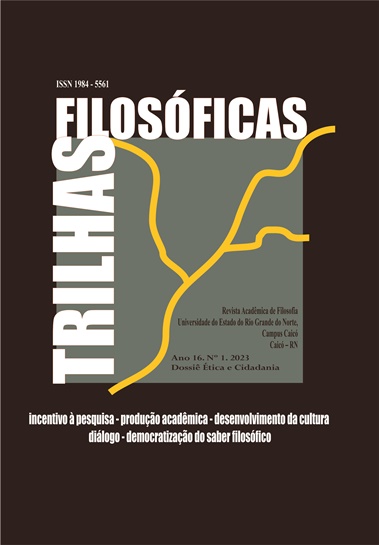Limits of abstract citizenship in contemporary Brazil from the irreligious criticism of the young Marx
DOI:
https://doi.org/10.25244/tf.v16i1.5491Keywords:
Abstract Citizenship in Brazil, Irreligious Criticism, Human Emancipation, Political Emancipation, Young MarxAbstract
This reflection aims to show the limits of the type of citizenship in contemporary Brazil, inaugurated in the French Revolution, anchored in some writings of the young German philosopher Karl Heinrich Marx (1818-1883), under his criticisms of religion, namely: On the Jewish question (1843), Critique of Hegel's Philosophy of Law – Introduction (1843), Economic-Philosophical Manuscripts (1844), Critical glosses on the article “'The King of Prussia and Social Reform'. From a Prussian” (1844) and Theses on Feuerbach (1945). We also intend to make explicit the actuality of Marxian theory and, from this, continue to make of it what Marx called “a weapon of criticism”. Marx made us understand why in Brazil the rights of the human person are not fully realized, even prescribed in the Federal Constitution and regulated. By criticizing political emancipation, Marx showed us how humans abandoned their real human community, just as in religion, humans became a creature of their own creation, a god outside of man. This is how the Brazilian State became: a country with abstract citizenship, because it guarantees the full satisfaction of the social needs of its citizens only at the level of abstract law, the State itself being placed as a universal mediator from the lost real human community.
Downloads
References
CARTA de Pêro Vaz de Caminha. Público. São Paulo, 5 mar. 2014. Disponível em: ˂http://www.publico.pt/culturaipsilon/noticia/a-carta-de-pero-vaz-de-caminha-1627013˃. Acesso em 23 jun. 2015.
CHAUÍ. Brasil: mito fundador e sociedade autoritária. São Paulo: Editora Fundação Perseu Abramo, 2000.
FEUERBACH, Ludwig. Princípios da Filosofia do Futuro. Tradução de Artur Morão. Lisboa-Portugal: edições 70, 1988.
FEUERBACH, Ludwig. Preleções sobre a essência da religião. Tradução de José da Silva Brandão. Petrópolis, RJ: Vozes, 2009.
FEUERBACH, Ludwig. A Essência do Cristianismo. Tradução de José da Silva Brandão. Petrópolis: EDITORA VOZES, 2013.
HEGEL, G.W.F. Filosofia do Direito. 2. ed. Tradução de Paulo Meneses... [et al.]. São Leopoldo, RS: Editora Unisinos, 2010; Ipiranga, SP: Edições Loyola, 2010.
MARX, Karl. Tesis sobre Feuerbach. Buenos Aires: Calden, 1969.
MARX, Karl. Sobre a Questão Judaica. Tradução de Nélio Schneider. São Paulo: Boitempo, 2010a.
MARX, Karl. Glosas críticas ao artigo “‘O rei da Prússia e a reforma social’. De um prussiano”. In: MARX, Karl; ENGELS, Friedrich. Lutas de classes na Alemanha. Tradução de Nélio Schneider. São Paulo: Boitempo, 2010b. p. 25-52.
MARX, Karl. Crítica da Filosofia do Direito de Hegel- Introdução. In: MARX, Karl. Crítica da Filosofia do Direito de Hegel. Tradução de Rubens Enderle, Leonardo de Deus. São Paulo: Boitempo, 2011. (p. 145-157)
MARX, Karl. Manuscritos Econômico-Filosóficos. Tradução de Jesus Ranieri. São Paulo: Boitempo, 2012.
MARX, Karl. Crítica da dialética e da filosofia hegelianas em geral. In: MARX, Karl. Manuscritos Econômico-Filosóficos. Tradução de Jesus Ranieri. São Paulo: Boitempo, 2012.
SAMPAIO, Benedito Arthur; FREDERICO, Celso. 1843. In: MARX, Karl. Dialética e materialismo: Marx entre Hegel e Feuerbach. Rio de Janeiro: Editora UFRJ, 2006. p. 9-25.
Downloads
Published
How to Cite
Issue
Section
License
Copyright (c) 2023 Paulo Eduardo de Sousa

This work is licensed under a Creative Commons Attribution-NonCommercial-ShareAlike 4.0 International License.
DECLARAÇíO DE DIREITO AUTORAL
1 Ao submeter trabalhos í revista Trilhas Filosóficas, caso este seja aprovado, o autor autoriza sua publicação sem quaisquer ônus para a revista ou para seus editores.
2 Os direitos autorais dos artigos publicados na Trilhas Filosóficas são do autor, com direitos de primeira publicação reservados para este periódico.
3 Fica resguardado ao autor o direito de republicar seu trabalho, do modo como lhe aprouver (em sites, blogs, repositórios, ou na forma de capítulos de livros), desde que em data posterior fazendo a referência í revista Trilhas Filosóficas como publicação original.
4 A revista se reserva o direito de efetuar, nos originais, alterações de ordem normativa, ortográfica e gramatical, com vistas a manter o padrão culto da língua, respeitando, porém, o estilo dos autores.
5 Os originais não serão devolvidos aos autores.
6 As opiniões emitidas pelos autores são de sua inteira e exclusiva responsabilidade.
7 Ao submeterem seus trabalhos í Trilhas Filosóficas os autores certificam que os mesmos são de autoria própria e inéditos, ou seja, não publicados anteriormente em qualquer meio digital ou impresso.
8 A revista Trilhas Filosóficas, motivada em dar ampla divulgação das publicações, poderá replicar os trabalhos publicados nesta revista, através do link da edição de um número publicado, ou mesmo fornecendo o link de artigo específico publicado, em outros meios de comunicação como, por exemplo, redes sociais (Facebook, Academia.Edu, Scribd, etc).
9 A revista Trilhas Filosóficas adota a Política de Acesso Livre para os trabalhos publicados sendo sua publicação de acesso livre, pública e gratuita. Portanto, os autores ao submeterem seus trabalhos concordam que os mesmos são de uso gratuito sob a licença Creative Commons - Atribuição Não-comercial 4.0 Internacional.
10 O trabalho submetido poderá passar por algum software em busca de possíveis plágios para averiguar a autenticidade do material e, assim, assegurar a credibilidade das publicações da Trilhas Filosóficas e do próprio autor diante da comunidade filosófica do país e do exterior.
11 Mas, apesar disto, após aprovação e publicação do artigo, for constatando qualquer ilegalidade, fraude, ou outra atitude que coloque em dúvida a lisura da publicação, em especial a prática de plágio, o trabalho estará automaticamente rejeitado.
12 Caso o trabalho já tenha sido publicado, será imediatamente retirado da base da revista Trilhas Filosóficas, sendo proibida sua posterior citação vinculada a ela e, no número seguinte em que ocorreu a publicação, será comunicado o cancelamento da referida publicação. Em caso de deflagração do procedimento para a retratação do trabalho, os autores serão previamente informados, sendo-lhes garantidos o direito í ampla defesa.
13 Os dados pessoais fornecidos pelos autores serão utilizados exclusivamente para os serviços prestados por essa publicação, não sendo disponibilizados para outras finalidades ou a terceiros.



